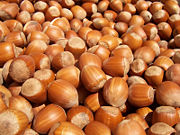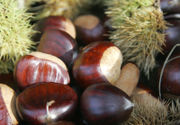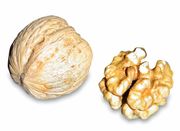Nut
Nut is a general term for the dry seed or fruit of some plants. While a wide variety of dried seeds and fruits are called nuts, only a certain number of them are considered by biologists to be true nuts. Nuts are an important source of nutrition for both humans and wildlife. more...
Botanical Definition
A nut in botany is a simple dry fruit with one seed (rarely two) in which the ovary wall becomes very hard (stony or woody) at maturity, and where the seed remains unattached or unfused with the ovary wall. Most nuts come from the male pistils with inferior ovaries (see flower) and all are indehiscent (not opening at maturity). True nuts are produced, for example, by some plants — families of the order Fagales.
- Order Fagales
- Family Juglandaceae
- Walnut—esp. Persian Walnut (Juglans regia)
- Butternut (Juglans)
- Hickory, Pecan (Carya)
- Wingnut (Pterocarya)
- Family Fagaceae
- Chestnut (Castanea)
- Beech (Fagus)
- Oak (Quercus)
- Stone-oak, Tanoak (Lithocarpus)
- Family Betulaceae
- Alder (Alnus)
- Birch (Betula)
- Hazel, Filbert (Corylus)
- Hornbeam
Culinary definition and uses
A nut in cuisine is a much less restrictive (but vital) category than a nut in botany, as the term is applied (from the viewpoint of the cook, not of a botanist) to many seeds that are not botanically true nuts. Any large, oily kernel found within a shell and used in food may be regarded as a nut. Because nuts generally have a high oil content, they are a highly prized food and energy source. A large number of seeds are edible by humans and used in cooking, eaten raw, sprouted, or roasted as a snack food, or pressed for oil that is used in cookery and cosmetics. Nuts (or seeds generally) are also a significant source of nutrition for wildlife. This is particularly true in temperate climates where animals such as jays and squirrels store acorns and other nuts during the autumn to keep them from starving during the late autumn, all of winter, and early spring.
Nuts, including both tree nuts and peanuts, are among the most common food allergens.
Some fruits and seeds that are nuts in the culinary sense but not in the botanical sense:
- Almond is the edible seed of a drupe — the leathery "flesh" is removed at harvest.
- Brazil nut is the seed from a capsule.
- Candlenut (used for oil) is a seed.
- Cashew nut is a seed.
- Coconut is a dry, fibrous drupe.
- Horse-chestnut is an inedible capsule.
- Macadamia nut is a creamy white kernel (Macadamia integrifolia).
- Malabar chestnut
- Mongongo
- Peanut is a legume and a seed.
- Pine nut is the seed of several species of pine (coniferous trees).
- Pistachio nut is the seed of a thin-shelled drupe.
- Lychee is a member of the soapberry family, in which its berrylike fruits can be eaten fresh or sundried as nuts.
See also: List of edible seeds
Read more at Wikipedia.org




